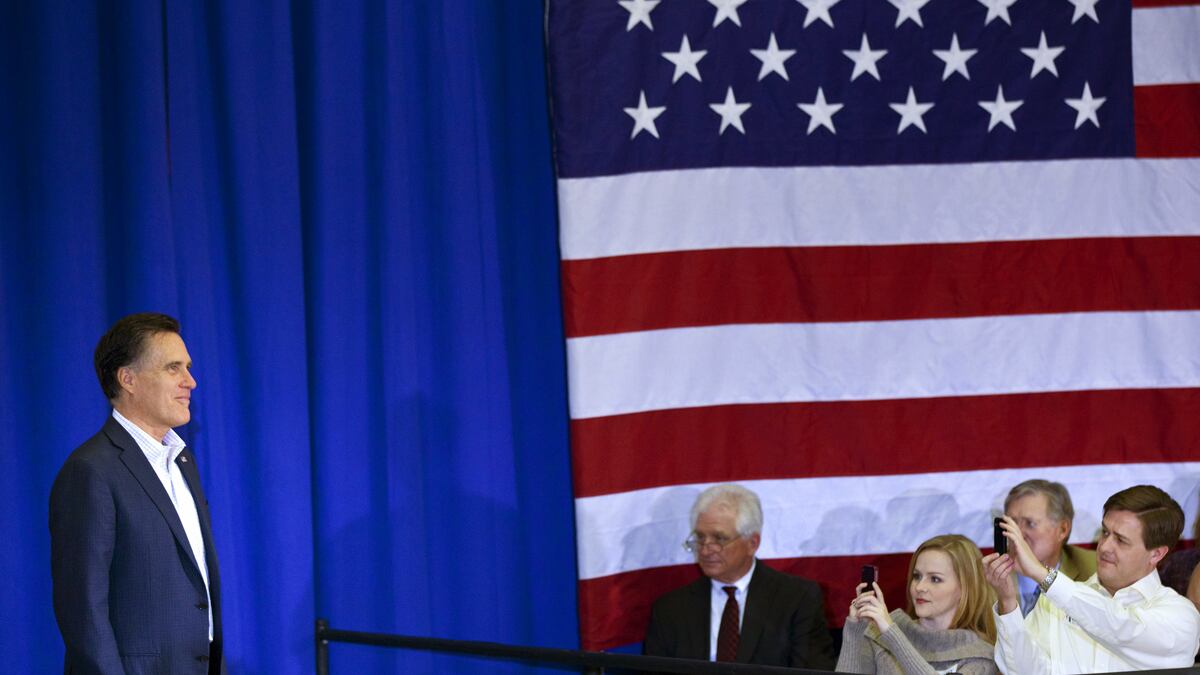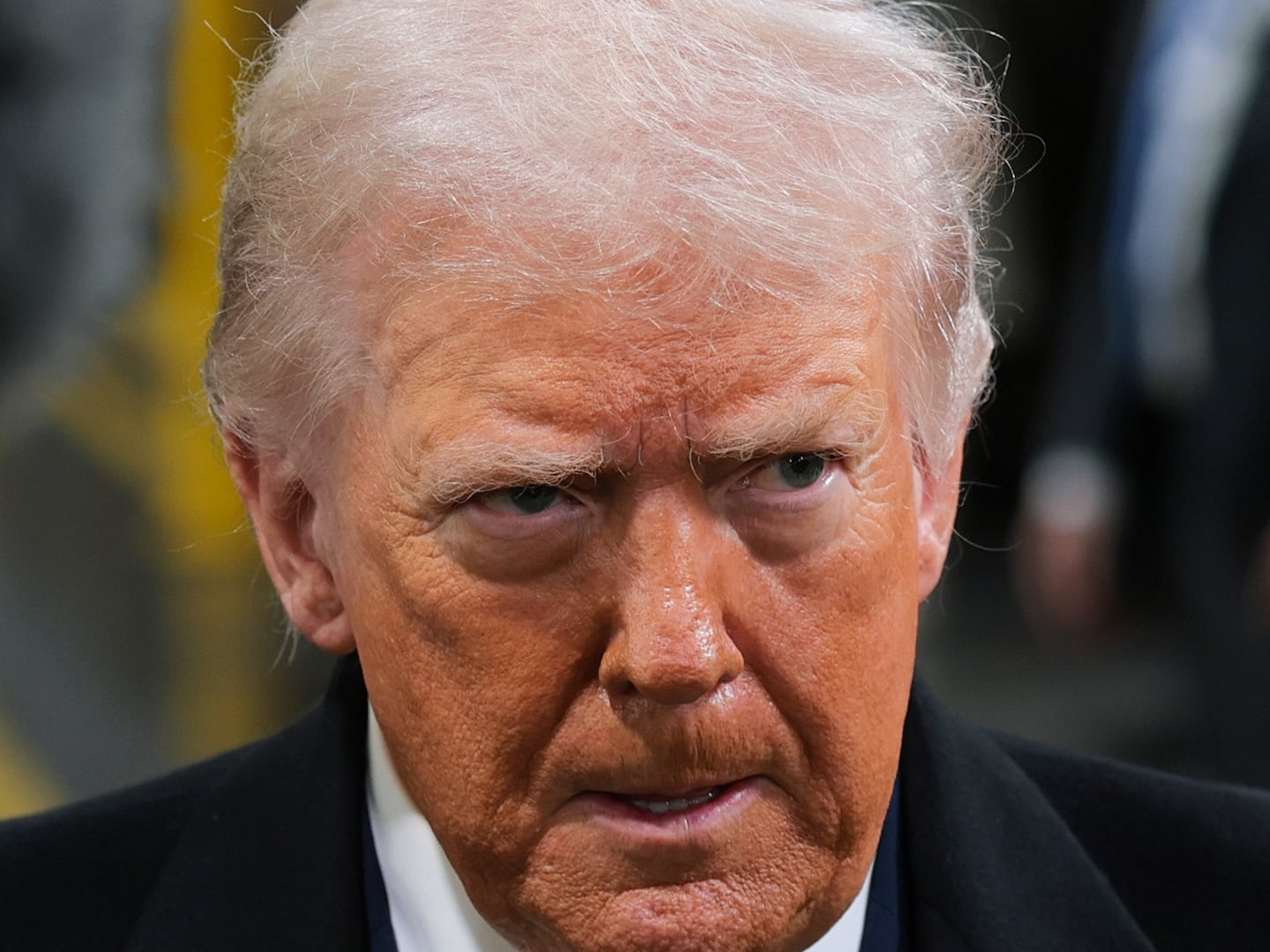It’s far from over. Despite claiming six state wins last night and upping his delegate count to 404, Mitt Romney still does not have a lock on the nomination—or even a clear path to claiming it if his opponents don’t leave the field.
Consider this: if Mitt wins every remaining all-or-nothing state but one, and half of the remaining proportional delegates, he would likely still fall short of the magic nomination number of 1,144—which would force him to rely on unpledged delegates, the Republican version of the infamous Democratic super-delegates in 2008, to claim his party’s mantle.

Even if Mitt somehow won every delegate in every coming contest, he still wouldn’t clinch the nomination until Oregon’s primary on May 15.
And if Romney musters only 40 percent of the proportional delegates going forward—equivalent to his share of the popular vote total to date—it would mean the first Republican race undecided when the convention opened in a generation.
In a press briefing later today, the Romney camp is expected to argue that Rick Santorum and Newt Gingrich have no chance of claiming the nomination, comparing their uphill climb to the extended delegate fight between Democrats Barack Obama and Hillary Clinton in 2008. This is true, but it purposefully misses the point. Santorum, Gingrich, and Paul individually have no real path to winning the delegate fight—but collectively they are positioned to deny the nomination to Romney and kick the contest to the convention in Tampa, where all delegates are released after the first ballot.
Ron Paul’s supporters have been assured that he’ll take their case all the way to the convention—this is a cause more than a candidacy. Newt Gingrich at this point seems motivated as much by personal animus toward Romney as any hope for being the actual nominee. In his speech last night, he repeatedly slammed the former Massachusetts governor as “the Wall Street candidate.” And only Santorum would be susceptible to the traditional bait—get out now and you’ll have a future in the party, perhaps even the next in line for the nomination. But the old-school olive branch—offering Rick the VP slot—seems unlikely in the extreme. There is just too much bad blood.
An intraparty fight that ran through August would be the equivalent of water torture for the Republican establishment, and they are no doubt seeking ways to stop the pain.
One way would be to muscle the nomination to Romney by swinging the remaining unpledged delegates to Team Mitt. These are delegates who have earned their seats at the convention for serving as party officials rather than being elected. This would not only echo the Democrat’s super-delegate struggle after their proportional primary fight in 2008, it would also unhelpfully deepen narratives about Romney being the establishment candidate. But a win is a win, and as Richard Nixon used to say, “Finishing second in the Olympics gets you silver. Finishing second in politics gets you oblivion.”
The other plan will be to try to force the other candidates out of the race. Behind-the-scenes strong-arming is the traditional means of thinning the herd. It allows a candidate to functionally lock the nomination up without the requisite number of delegates. This was the tradition that Romney bowed to at his CPAC speech in 2008, where he ceded the field. Eventually, Mike Huckabee came to the same conclusion, as activists rallied behind the presumptive nominee, John McCain.
But none of the three “non-Romneys” seems likely to yield to party pressure. This year is different because the rules of the game have changed. Unlike in years past, more than 40 states are allocating their delegates proportionally, instead of winner take all. That makes it much easier—and much more tempting—for a candidate to stay in the race and drag it out. Candidates this cycle can even offer a high-minded rationale: given the base’s lingering distaste for the longtime de facto nominee Romney, they can argue that such a stand would not be merely self-serving. Moreover, the rise of super PACs in the wake of Citizens United means the party is much less able to choke off funds as a means of pressuring candidates to withdraw.
While Romney gave a frontrunner’s speech Tuesday night, briefly congratulating his opponents before directing the bulk of his remarks at President Obama, he made a point of adjusting expectations, telling his cheering crowd: “Tomorrow, we wake up and we start again. And the next day, we'll do the same … There will be good days; there will be bad days.”
What is certain is that he won’t be able to rack up the delegates needed to lock up the nomination in the coming month, when more than 400 delegates will be awarded. And the schedule is not favorable for Romney—meaning narrative momentum is likely to shift against him at least in the near term.
On Saturday 40 delegates in socially conservative Kansas are up for grabs. That’s followed next Tuesday by joint primaries in Alabama and Mississippi, where nearly 90 combined delegates are at stake. Romney—who has never done well in the deep South, losing in Tennessee last night by nearly 10 points—seems unlikely to win any of these states.
After those states, there are successive showdowns in Missouri, where Santorum won a beauty contest primary by more than 20 points last month, as well as in Illinois and Louisiana. Finally, the month ends with Potomac primaries of Maryland and D.C. along with Wisconsin’s nomination contest on April 3. The big delegate prizes of New York, California, and Texas loom ahead, with the final primary—fortuitously for Romney, Utah—scheduled for late June.
There is no question that things would be neater for the GOP if the contest were cut short. The 2008 Democratic contest arguably made candidate Obama stronger because he was competing with Hillary Clinton for conservative Democrats and other centrist swing voters—but the GOP candidates are fighting for the far right, which will make it much tougher for the eventual nominee to tack back to the center and win independent voters in the general election.
Blame the RNC for putting these proportional contests in place to benefit conservative activist candidates over conventional-wisdom establishment picks. Conservatives across the country are getting a chance to vote but leaving all candidates bloodied and bruised in the process, with skyrocketing negative ratings across the board.
But the delegate math shows that the earliest this contest could be over is May—and the latest, Utah in late June or even August in Tampa.
Unless Santorum, Gingrich, or Paul can be prematurely pressured out, this contest will go on. Momentum drives the story line, but math drives the delegate count, and that may be all that matters in this year’s proportional fight for the Republican nomination.







